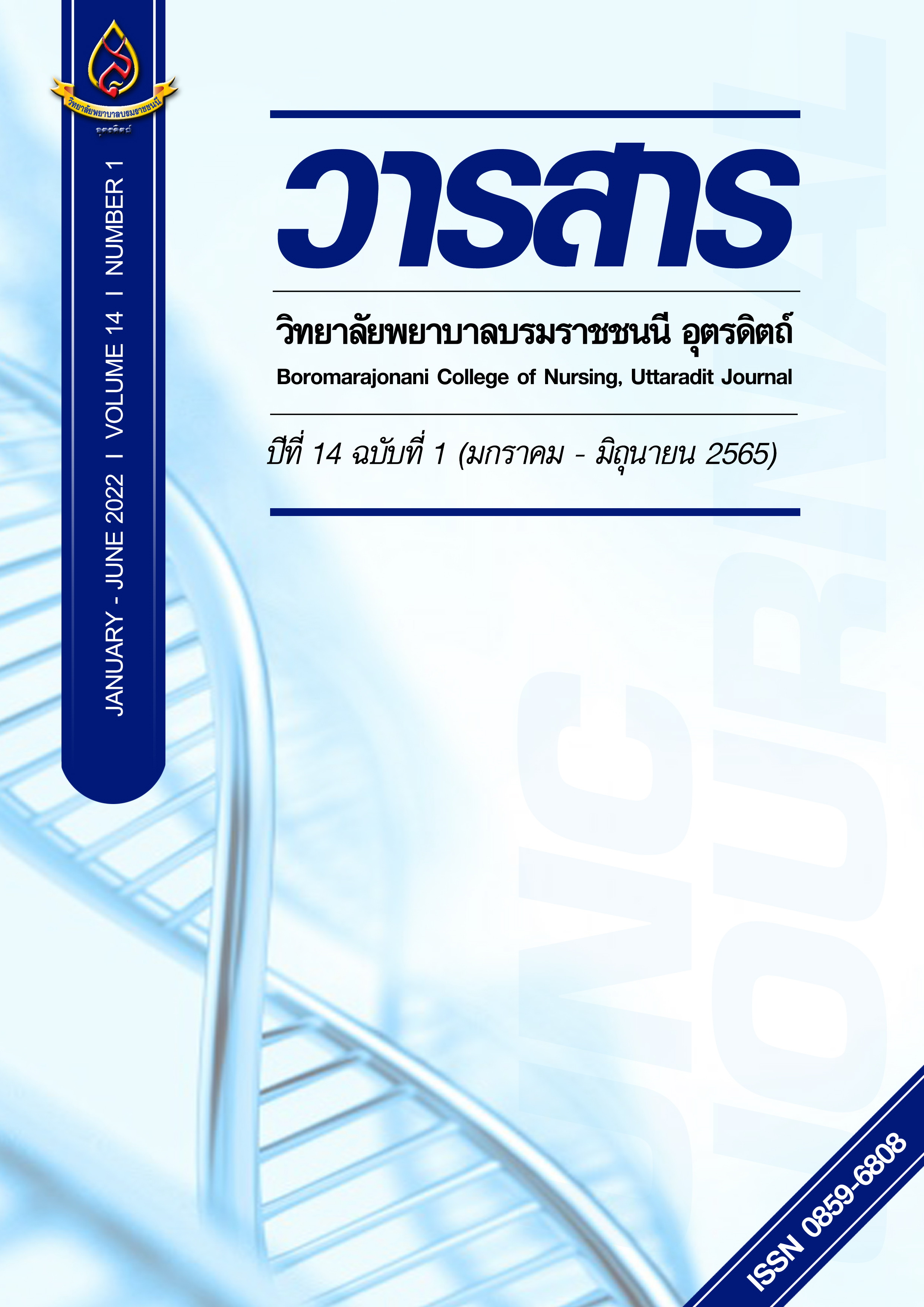ประสิทธิผลของโปรแกรมการจัดการตนเองโดยใช้สมาธิบำบัดแบบ SKT ต่อผลลัพธ์ทางสุขภาพในผู้สูงอายุกลุ่มเสี่ยงความดันโลหิตสูง
Main Article Content
บทคัดย่อ
การวิจัยครั้งนี้มีวัตถุประสงค์เพื่อศึกษาประสิทธิผลของโปรแกรมการจัดการตนเองโดยใช้สมาธิบำบัดแบบ SKT ต่อผลลัพธ์ทางสุขภาพของผู้สูงอายุกลุ่มเสี่ยงความดันโลหิตสูง กลุ่มตัวอย่างคือผู้สูงอายุที่มีอายุ 60 -74 ปี ที่อาศัยอยู่ในเขตรับผิดชอบในหน่วยบริการปฐมภูมิของโรงพยาบาลส่งเสริมสุขภาพตำบล ม่อนดินแดง อ.ลับแล จ.อุตรดิตถ์ จำนวน 30 คน ดำเนินการวิจัยแบบกึ่งทดลอง เครื่องมือในการวิจัยเป็นโปรแกรมการจัดการตนเองโดยใช้สมาธิบำบัดแบบ SKT สำหรับผู้สูงอายุกลุ่มเสี่ยงความดันโลหิตสูงและแบบวัดพฤติกรรมการจัดการตนเองสำหรับผู้สูงอายุกลุ่มเสี่ยงความดันโลหิตสูงที่ผ่านการตรวจสอบความตรงเชิงเนื้อหาและได้ค่าความเชื่อมั่นสัมประสิทธิ์อัลฟาครอนบาค เท่ากับ .87 วิเคราะห์ข้อมูลโดยสถิติเชิงพรรณนาและสถิติทดสอบ Paired Sample t-test
ผลการศึกษา พบว่า หลังเข้าร่วมโปรแกรมการจัดการตนเองโดยใช้สมาธิบำบัดแบบ SKT ผู้สูงอายุกลุ่มเสี่ยงความดันโลหิตสูงมีผลลัพธ์ทางสุขภาพดีกว่าก่อนเข้าร่วมโปรแกรมฯ ดังนี้
1. ค่าเฉลี่ยระดับความดันโลหิตซิสโตลิกและไดแอสโตลิกเฉลี่ยภายหลังเข้าร่วมโปรแกรมการจัดการตนเองโดยใช้สมาธิบำบัดแบบ SKT มีค่าเฉลี่ยลดลงกว่าก่อนเข้าร่วมโปรแกรมฯ อย่างมีนัยสำคัญทางสถิติที่ระดับ .05
2. ค่าเฉลี่ยคะแนนพฤติกรรมการจัดการตนเองของผู้สูงอายุกลุ่มเสี่ยงความดันโลหิตสูงหลังเข้าร่วม
โปรแกรมการจัดการตนเองโดยใช้สมาธิบำบัดแบบ SKT สูงกว่าก่อนเข้าร่วมโปรแกรมฯ อย่างมีนัยสำคัญทางสถิติที่ระดับ .05
Article Details

อนุญาตภายใต้เงื่อนไข Creative Commons Attribution-NonCommercial-NoDerivatives 4.0 International License.
บทความหรือข้อคิดเห็นใดใดที่ปรากฏในวารสารวิจัยการพยาบาลและวิทยาศาสตร์สุขภาพ เป็นวรรณกรรมของผู้เขียน ซึ่งบรรณาธิการหรือสมาคมศิษย์เก่า ไม่จำเป็นต้องเห็นด้วย และบทความที่ได้รับการตีพิมพ์เผยแพร่ถือเป็นลิขสิทธิ์ของวารสารวิจัยการพยาบาลและวิทยาศาสตร์สุขภาพ
เอกสารอ้างอิง
Aronow, W.S. (2011). Office management of hypertension in older persons. The American Journal of Medicine, 124, 498-500.
Bell, K., Twiggs, J. & Olin, B.R. (2015). Hypertension: The silent killer: updated JNC-8 guideline recommendations. Continuing Education, summer, 1-8.
Chibsamanboon, P., Suttineam, U. (2013). Effects of the Somporn Kantaradusdi- TriamchaisriTechnique 2 (SKT2) on blood pressure levels and Biochemical Markers. Journal of Boromarajonani College of Nursing, Bangkok, 29(2), 122-33. (in Thai).
Costantini, L., Beanlands, H., McCay, E., Cattran, D., Hladunewich, M., & Francis, D. (2008). The self-management experience of people with mild to moderate chronic kidneydisease. Nephrology Nursing Journal, 35(2), 147.
Division of Non Communicable Diseases (2017). Behavior modification handbook in quality NCD clinics. (1st ed.). Bangkok: The Printing office the agricultural Co-operative Federation of Thailand.
Egan, BM., Stevens-Fabry, S.(2015).Prehypertension-prevalence, health risks, andmanagement strategies. Nature Reviews Cardiology, 12, 289-300.
Health Data Center (HDC) Uttaradit province. (N.d.) Retrieved (2021, October 20) from
https://utt.hdc.moph.go.th/hdc/main/index.php. (in Thai).
Lorig, K. R., & Holman, H. R. (2003). Self-management education: history, definition, outcomes, and mechanisms. The Society of Behavioral Medicine, 26(1), 1-7.
Murman, D. L. (2015). The Impact of Age on Cognition. Seminars in hearing, 36(3), 111-121.
Polit, D. F., & Hungler, B. P. (1999). Nursing research: Principles and methods (6th ed.). Philadelphia: Lippincott.
Seephom, S. (2013). Self-management in chronic kidney disease. Thai Red Cross Nursing
Journal, 6(1), 12-18. (in Thai).
Thai Hypertension Society. (2020). Guidelines in the treatment of hypertension 2019. Retrieved (2021, October 20) from http://www.thaihypertension.org. (in Thai).
Thongmee, S., Ouleaphan, M. (2557). Effects of SKT meditation practice on blood pressure in hypertension patients. Retrieved (2021, October 20) from http://www.thaicam.go.th/attachments/article/584/20052557%2014.45-15.30.pdf. (in Thai).
Triamchaisri, S.K. (2019). Meditation Practice for Health. Edition 15th. Bangkok: The Printing Office Agency to assist veterans in Royal Shu patham. (in Thai).
World Health Organization. (2004). The world health report 2004: changing history. World Health Organization.


